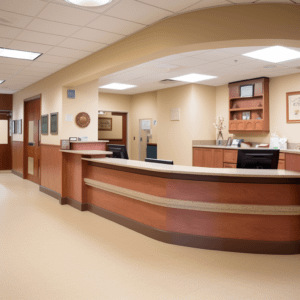If you have information about healthcare fraud, waste, or abuse taking place, get in touch with our legal team as soon as possible. The lawyers at Tycko & Zavareei LLP are well-versed in whistleblower claims and qui tam law. Our firm can offer invaluable guidance and insight on your journey as a whistleblower. Time is of the essence when reporting fraud, so please do not hesitate to reach out to a healthcare fraud whistleblower lawyer today.
What Is Healthcare Fraud, Waste, and Abuse?
Healthcare fraud, waste, and abuse encompasses many fraudulent practices, including:
 Health insurance fraud
Health insurance fraud- Medical accounting fraud
- Medical billing malpractice
- At-home healthcare Medicare fraud
- Prescription and medication abuse
- Lab fraud
Healthcare fraud, waste, and abuse occur when healthcare providers such a physicians, nurses, at-home caregivers, and nursing home staff lie to insurers or the government, endangering patients, and ultimately hurting taxpayers in the pursuit of profits. Any medical staff member and healthcare facility that attempts to defraud government-funded health insurance programs could be on the hook for healthcare fraud under the False Claims Act.
Common Types of Healthcare Fraud
Upcoding & Unbundling
Medicare and Medicaid offer healthcare providers reimbursement for medical services and procedures performed on eligible patients. Healthcare providers are responsible for reporting what services were rendered to a patient using “codes” that indicate to insurance how much to reimburse for the cost of the care. Upcoding occurs when a healthcare provider reports a code for a procedure that is more expensive and which was not actually performed. They do this to try to receive more funds from Medicaid and Medicare than they are actually owed.
Similarly, some medical services should be bundled together when reporting to Medicare or Medicaid. Unscrupulous healthcare providers may engage in unbundling fraud when they deliberately separate those services and bill for them individually. Unbundling services and procedures that should have been cheaper when charged together can lead to bigger bills for patients, too, who are responsible for copays. Anyone with information about upcoding and unbundling should connect with a diligent healthcare fraud attorney on our team for guidance on what to do next.
 Double Billing
Double Billing
Healthcare providers engage in double billing when they obtain payment or reimbursement for the same service multiple times. For example, billing a private insurer while receiving payment from Medicare or Medicaid, or billing twice for a service that was only performed once would constitute double billing. Anyone with information concerning fraudulent billing by a healthcare provider is encouraged to work with one of our lawyers to ensure their rights as a whistleblower are vehemently protected.
Billing for Unnecessary Medical Services
A healthcare provider may offer false diagnoses or order tests and procedures which are not medically necessary to address a patient’s condition in order to garner more funds from Medicare and Medicaid. The dangerous distinction between this type of healthcare fraud and upcoding is that the patient may be at risk of suffering additional harm. Doctors and hospitals who perform and bill for unnecessary medical services put their patients’ needs second to profits and endanger their health, making it crucial for whistleblowers with information on billing fraud to come forward.
Health Insurance Fraud
Medicare, Medicaid, the Children’s Health Insurance Program (CHIP), and other public health programs all help provide health insurance coverage to more than 135 million Americans, according to the latest enrollment figures from the Centers for Medicare & Medicaid Services (CMS). When unscrupulous providers, treatment centers, EHR vendors, and pharmaceutical companies attempt to draw down these public funds, they harm every American who pays into the system as well as those who are enrolled.
Health insurance fraud takes many forms. It may look like attempting to underpay pharmaceutical rebates, prescribing unnecessary tests to patients, accepting or offering kickbacks, or many more illegal acts. No matter what form it takes, fraud and abuse in healthcare that involves reimbursement from government funds may be reportable under the False Claims Act. Whistleblowers who speak up about health insurance fraud may be eligible to receive significant financial awards in exchange for their honesty.
 Kickback Schemes
Kickback Schemes
Individuals who refer patients to a particular hospital or doctor may unlawfully accept payment for the referral in what is known as a kickback scheme. “Kickbacks” are unfortunately common in healthcare fraud cases. Examples of kickback schemes include when a doctor accepts money in exchange for patient referrals or refers patients to a facility with which they share a financial relationship. Kickback schemes are an example of federal healthcare fraud and may be prosecuted at the federal level.
Nurses and Staff Performing Exams
Medicare and Medicaid billing rules require certain procedures to be performed by a physician only. However, more and more hospitals are allowing nurses or other medical staff members to perform procedures while billing for the cost of a physician’s time. Doing so violates the False Claims Act and could endanger patients if an inexperienced or undertrained staff member performs a complex medical procedure. If you experienced this firsthand or have first-hand knowledge of it occurring at your place of employment, do not hesitate to reach out to one of our dedicated healthcare fraud attorneys.
Lab Fraud Schemes
Ordering unnecessary laboratory tests, scans, or screens is an example of healthcare fraud that puts vulnerable patients at risk. Usually physicians are acting in your best interests by ruling out different diagnoses through a series of laboratory tests. When taken too far, however, this may be an example of lab fraud. Manipulating laboratory processes, billing, or results in order to maximize profit can also be reported to a healthcare fraud lawyer. Laboratories are not permitted to offer financial incentives to physicians in order to bring in more business, or ensure patients use their particular services for screening.
At-Home Healthcare Fraud
At-home health care has grown significantly as an industry and healthcare option in the United States. More and more, families choose at-home healthcare as an option to care for aging parents and other family members. However, because of its implicit lack of oversight and looser infrastructure, at-home health care also comes with an increased risk of fraud, waste, and abuse. Over-reporting of hours and over-billing is of particular concern in the home healthcare field. Home health providers have been prosecuted for accepting a paycheck without providing services to patients in need, or for cutting corners while reporting full hours and performance of duties.
Pharmaceutical Fraud
Pharmaceutical companies in the United States have an unprecedented amount of power in setting prices for life-saving drugs. Reporting pharmaceutical fraud and corruption is one way to stand up to corporate greed and increase access to these breakthrough drugs.
One way that pharmaceutical companies often try to cheat the system is by not complying with the Medicaid Best Price Rule. Under this federal law, Medicaid members pay the lowest price available on the market for pharmaceuticals that are eligible for the Medicaid Drug Rebate program. This means that if the price for a drug is $42 at the pharmacy, but the best price available is as low as $12, the manufacturer owes Medicaid a $30 rebate in order to reduce the cost back down to “best price” levels. This pricing structure includes rebates offered to pharmacies, as well as bulk and volume discounts currently available on the market.
Pharmaceutical companies may attempt to conceal these kinds of pricing structures or misreport their rates in order to keep the alleged “best price” higher. They may also offer illegal kickbacks, disguised discounts, or try to promote the use of their drug to providers in order to increase prescriptions. All of these actions are reportable under the False Claims Act, and may earn you a qui tam whistleblower award in the million-dollar range for speaking up.
Fraud Involving Health Records
EHR fraud is unfortunately a booming business, as faulty electronic health record software has taken its toll on the medical profession. EHR fraud often takes place in two different ways: fraudulent certification of bad technology, or fraudulent billing practices disguised by complex, non-intuitive software.
Because of the many predicted positive outcomes of EHR software, Medicare’s EHR Incentive Program offers payments to providers that demonstrate “meaningful use” of the technology to benefit their patients. Due to these government reimbursement payments, EHR manufacturers and vendors that misrepresent the accuracy and potential of their product can be held accountable under the False Claims Act. Additionally, healthcare providers that file for incentive payments without making meaningful use of EHR can be reported for fraud. Likewise, EHR fraud may take place when providers mask over billing, unbundling, or other kinds of false claims as malfunctions of their clinic’s software.
Treatment Centers and Other Health Facilities

Nursing homes and long-term care facilities must submit an annual cost report to receive reimbursement from Medicaid and Medicare. The administrators of assisted living facilities commit healthcare fraud when they include personal expenses in these cost reports, as well as when they certify work being done that is not in actuality provided to patients.
The Department of Justice takes treatment center fraud very seriously, particularly when it concerns defrauding the VA of taxpayer funds and neglecting or abusing veterans. If you have information about a treatment center that is offering payments or incentives to receive patients, this may be a form of patient brokering that is highly illegal and dangerous. If you can report nursing home abuse or patient treatment center fraud, do so at once to save lives and spare families heartbreak.
Why Is Healthcare Fraud Harmful?
The consequences of medical fraud cannot be understated. Outcomes of healthcare fraud include increased insurance premiums, increased taxes, and patient exposure to unnecessary medical procedures. All outcomes affect everyday people and all of us who pay into the system. What is more, patients who suffer harm as a consequence of fraudulent testing, unnecessary medical services, and lack of proper care will require continued medical treatment, further incentivizing unscrupulous medical professionals to engage in more fraudulent activity. Becoming a whistleblower is the best way to break this cycle of waste, fraud, and abuse. Doing so saves millions of taxpayer dollars every year, and protects countless patients from harm.
How to Report Healthcare Fraud
The best way to report false medical billing is to hire a qui tam lawyer. A healthcare fraud attorney can help you anonymously report a medical facility under the federal False Claims Act as well as any applicable state laws. You may be able to file a qui tam lawsuit anonymously through a qui tam law firm.
Whistleblower attorneys understand the ins and outs of filing a whistleblower claim, including what deadlines and legal protections may apply in a given health care fraud case. They will also be able to ensure your rights as a whistleblower are protected, and follow up on the case with any Department of Justice investigators, no matter how long the process takes to unfold. Finally, in the event that government agents decline to intervene in the case, a good qui tam lawyer may be able to file the case on your behalf, and deliver the highest whistleblower percentage payout possible in the event that your claim is successful.
Protections for Healthcare Fraud Whistleblowers
If your reporting of healthcare fraud leads to the recovery of defrauded funds, you may be entitled to a reward under a whistleblower law called the False Claims Act. The False Claims Act also protects employees who blow the whistle on fraudulent activity taking place at their jobs from being demoted, suspended, terminated, threatened, harassed, or otherwise discriminated against in retaliation.
Whistleblowers who do experience workplace retaliation after blowing the whistle on healthcare fraud may seek reinstatement to their previously held position, twice the amount of missed or unpaid wages plus interest, and compensation for special damages such as emotional distress and attorneys’ fees. A case for unlawful retaliation by an employer may be brought with or separately from a qui tam lawsuit filed under the False Claims Act.
Can a Healthcare Whistleblower Remain Anonymous?
Healthcare fraud whistleblowers who file qui tam cases under the False Claims Act may begin their claims anonymously. Specifically, the False Claims Act allows whistleblowers, or qui tam relators, to remain anonymous until the government completes its investigation into the fraud they reported. If the government finds evidence of healthcare fraud based on your tip, you may be required to disclose certain facts for further proceedings. However, filing with a qui tam attorney can help protect your personal identity by filing the legal claim under the name of the qui tam law firm.
Hiring a Healthcare Whistleblower Law Firm
If you have knowledge of any signs of health fraud, waste, or abuse in the Medicare, Medicaid, TRICARE, Veterans, or Federal Employees Health Benefits (FEHB) programs, your information could lead to the recovery of substantial funds and entitle you to a significant financial award. The Department of Justice has recovered billions of dollars in healthcare fraud thanks to ordinary individuals like you who report medical fraud, waste, and abuse.
There are also protections available for False Claims Act whistleblowers who have already reported fraud and were retaliated against as a result. You can tell us about the information you have during a free consultation at our firm. Complete the short, confidential contact form and a whistleblower attorney with Tycko & Zavareei LLP will promptly get back to you.


 Double Billing
Double Billing Kickback Schemes
Kickback Schemes









